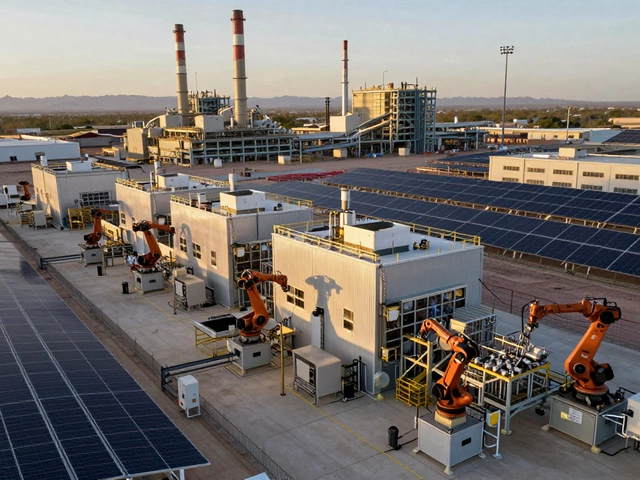Ever wondered what's hot in the business world right now? Manufacturing startups are taking the spotlight, and it's not hard to see why. Picture a field where cutting-edge technology meets age-old practices—igniting innovation on every front. Curious about how today's entrepreneurs are making their mark in this industry?
One area driving massive change is sustainability. It's becoming more than just a buzzword—it's the new norm. Manufacturers are shifting gears to produce eco-friendly products, using recycled materials and reducing waste. If you're thinking about jumping into the manufacturing game, keeping an eye on green solutions could be key.
Meanwhile, automation and AI are revolutionizing how products are made, enhancing efficiency and lowering costs. Imagine robots handling repetitive tasks while human talent focuses on creativity and problem-solving. Getting into this space could mean rethinking traditional roles—are you ready to be a part of that transformation?
- Current Trends in Manufacturing
- Sustainability: The Green Revolution
- Automation and AI: Transforming Production
- Customization: Meeting Unique Demands
- Getting Started: Tips for Aspiring Entrepreneurs
Current Trends in Manufacturing
Diving into the world of manufacturing startups reveals a bunch of fresh and exciting trends. The landscape is changing fast, thanks to tech and a new focus on being sustainable. Businesses that adapt quickly and embrace these trends are the ones thriving.
Tech Integration
One of the biggest game-changers is technology. From smart factories using the Internet of Things (IoT) to real-time data analysis, tech is helping businesses cut costs and boost efficiency. Imagine factories where machines talk to each other, identifying issues before they arise. This kind of innovation is becoming the benchmark.
Sustainable Practices
Sustainability isn't just a fancy idea anymore; it’s a necessity. New regulations and consumer demand for eco-friendly products are pushing manufacturers to be green. This means using less energy, cutting down on waste, and finding clever ways to recycle materials. Businesses jumping on the
Sustainability: The Green Revolution
So, you're thinking about jumping into the world of manufacturing startups? If yes, it's hard to ignore the massive impact of sustainability in this sector. As demand grows for greener products, there's a whole revolution happening right now. Eco-friendly manufacturing isn't just about saving the planet—it's about spotting opportunities to make things better and more efficient.
Why Going Green is Good Business
First things first, sustainability can actually boost your bottom line. By reducing waste and using recycled materials, companies can cut costs significantly. Plus, more and more consumers are willing to pay a bit extra for products that don't harm the environment. It's pretty simple—less waste equals more profit. Here’s a wild fact: around 85% of global consumers have changed their buying habits to be more sustainable in the last five years.
Innovations in Sustainable Manufacturing
Looking for ways to go green in manufacturing? Here are some innovative ideas:
- Recycled Materials: Shift to using recycled inputs like plastics, glass, or metals. Not only does it reduce waste, but it also gives new life to materials otherwise headed for landfills.
- Energy-Efficient Technologies: Embrace renewable energy sources like solar or wind to power factories. It's all about reducing your carbon footprint.
- Water Conservation: Implement systems for water recycling and purification to save one of our most precious resources.
What You Can Do
It's not just about big changes. Little steps count too. For budding manufacturing startups, consider assessing your supply chain for inefficiencies or finding suppliers committed to sustainability. Looking to attract investment? Showcase your green credentials; investors love a good sustainability story.
| Strategy | Benefit |
|---|---|
| Use recycled materials | Reduce waste, cut costs |
| Switch to renewable energy | Lower emissions, long-term savings |
| Improve water management | Conserve resources, reduce bills |
As you can see, jumping on the green revolution bandwagon isn't just a moral choice—it's smart business. Being at the forefront of sustainable practices could be your ticket to success in today's competitive manufacturing landscape.

Automation and AI: Transforming Production
With automation and AI in the limelight, the manufacturing world is seeing a transformation that would have been hard to imagine even a decade ago. Here's where it gets exciting: factories are shifting from labor-intensive processes to smart, automated systems that do the heavy lifting.
Let's talk about robotics. Robots aren't just science fiction anymore—they're in factories handling tasks like welding, painting, and assembly. This tech isn't just about replacing workers; it's about enhancing human capabilities. Workers are freed up to focus on complex tasks, leading to higher job satisfaction and productivity.
Automation doesn’t just cut costs; it dramatically improves precision, resulting in fewer errors and higher quality products. Less scrap means more wins for the bottom line, and that’s something any aspiring startup should be thrilled about.
AI in Decision Making
When we throw AI into the mix, it becomes a game-changer. Ever heard of predictive maintenance? AI systems predict machinery failures before they happen, minimizing downtime and maximizing efficiency. This means less unexpected hiccups and steadier production.
On top of that, AI is helping with supply chain management. Algorithms are being used to predict demand trends, adjust inventory levels, and optimize delivery routes. Imagine cutting delivery costs while keeping customers happy—sounds like a win-win, right?
Take a peek at the following stats, showcasing just how big AI has become in manufacturing:
| Year | AI Adoption in Manufacturing |
|---|---|
| 2020 | 25% |
| 2025 | 60% (projected) |
This rapid adoption shows no signs of slowing down anytime soon, making now an ideal time to incorporate automation and AI into your startup plans.
Getting Started with Automation
So, how does one dive into the automation wave? It starts with understanding your processes and identifying which tasks can be streamlined. Partner with tech-savvy teams who can guide your transition, ensuring your business stays competitive without losing that personal touch.
To wrap it up, automation and AI are not just fancy terms—they’re tools reshaping industries. Whether you’re producing high-tech gadgets or everyday items, embracing these technologies is key to staying ahead.
Customization: Meeting Unique Demands
In today's world, customization isn't just a perk; it's a demand. With consumers wanting products that fit their exact needs, manufacturing startups are embracing personalization like never before. Think about it: would you rather have a one-size-fits-all gadget or something that's tailored to you? That's the magic of customization.
The trend is soaring, especially with advances in 3D printing and digital production techniques. These technologies make it easier for small businesses to offer tailored solutions at lower costs. Imagine being able to tweak a product’s design with just a few clicks to match your customer's preference.
The Role of Technology in Customization
Technology plays a huge role in making customization affordable and efficient. With automation tools, manufacturers can quickly adapt their production lines without massive retooling expenses. This means they can handle short runs and specific requests without breaking a sweat. Pretty cool, right?
Retail giants have also been jumping on this trend by offering personalization options online. This way, customers can choose colors, sizes, and even materials, all from the comfort of their own homes.
The Benefits for Businesses
For startups, the benefits are massive. Offering customized products can drive higher customer loyalty and word-of-mouth referrals. Happy customers tend to talk, and their friends are often eager to check out what all the fuss is about.
Beyond customer satisfaction, customization can also be a goldmine for data. Each customized order provides insights into customer preferences, allowing companies to fine-tune their offerings even more.
| Year | Percentage of Consumers Preferring Customized Products |
|---|---|
| 2020 | 50% |
| 2023 | 62% |
As the table shows, the appetite for personalized products is only growing. It's clear that more than half of consumers now prefer a tailored experience. Is your business ready to meet these unique demands?

Getting Started: Tips for Aspiring Entrepreneurs
Thinking about diving into the world of manufacturing startups? You're not alone. It's a bustling field with plenty of possibilities, but where do you even begin? Let's break it down.
Understand the Market
Kicking things off, you'll want to get a solid grasp on what the current market looks like. This means researching who your competitors are, what they're making, and where there's room for something new. Knowing your niche is crucial to stand out and succeed.
Focus on Innovation and Trends
The thriving industries are often the ones that aren't afraid to embrace change. Whether it's adopting sustainable practices or using the latest technology, keep your eyes open for trends that could give you a competitive edge. Automation, for example, is a big deal right now—think about how you can incorporate it into your plans to boost efficiency.
Create a Solid Business Plan
A good business plan doesn't just lay out what you aim to achieve, but also how you plan to achieve it. This includes outlining your financials, your target audience, and marketing strategy. Remember, a well-thought-out plan can guide you through those unexpected bumps along the road.
Find the Right Funding
Getting your hands on some starting capital is often a major hurdle. Look into various funding options like grants, loans, and investors. Recently, crowdfunding has become a popular way to drum up interest and support for unique ideas. Assess what fits best for your startup by weighing the pros and cons of each funding source.
Nurturing Your Network
Don't underestimate the power of a strong network. It's more than just exchanging business cards; it's about building relationships with mentors, industry experts, and potential partners. Join local business groups, attend relevant events, and engage online to grow your circle.
| Tip | Importance Level |
|---|---|
| Market Research | High |
| Innovation | High |
| Business Plan | Crucial |
| Funding | Essential |
| Networking | High |
At the end of the day, setting up a successful manufacturing startup is about preparation and flexibility. Dive in with a clear vision but stay adaptable for the unexpected twists and turns. Ready to make your mark?





